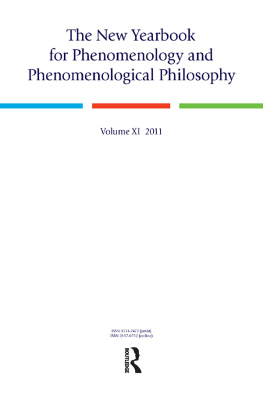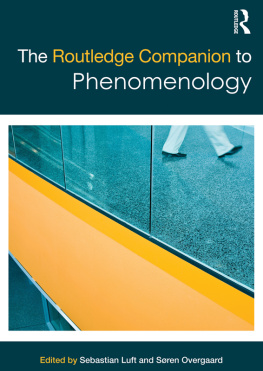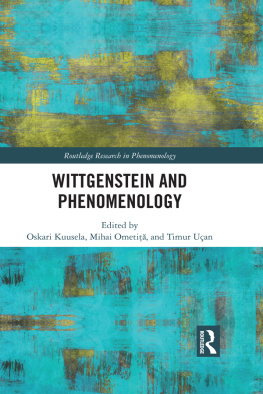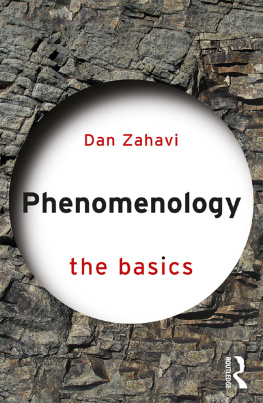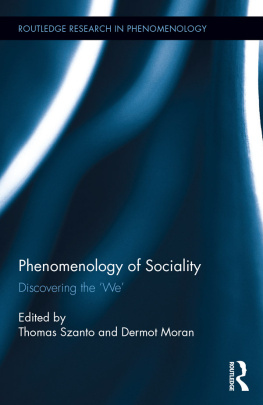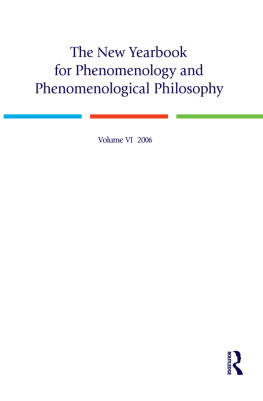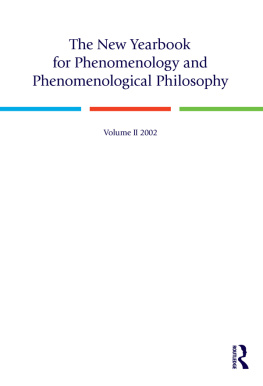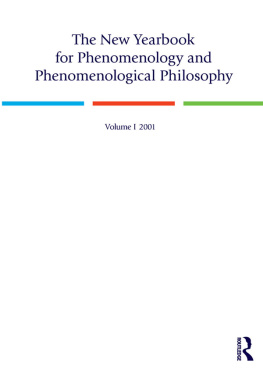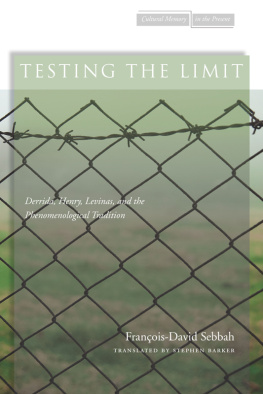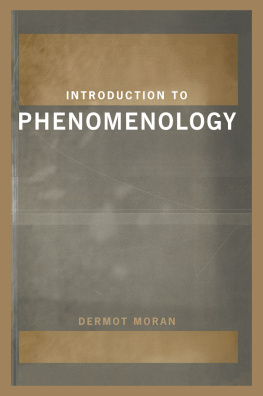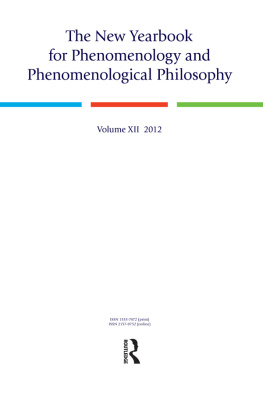THE NEW YEARBOOK FOR PHENOMENOLOGY AND
PHENOMENOLOGICAL PHILOSOPHY
In cooperation with
M. BRAINARD, London
R. BRUZINA, Kentucky
S. CROWELL, Houston
A. MICKUNAS, Ohio
T. SEEBOHM, Bonn
T. SHEEHAN, Stanford
Edited by
BURT HOPKINS
JOHN DRUMMOND
XI 2011

THE NEW YEARBOOK FOR PHENOMENOLOGY AND
PHENOMENOLOGICAL PHILOSOPHY
First published 2012 by Acumen
Published 2014 by Routledge
2 Park Square, Milton Park, Abingdon, Oxon OX14 4RN
711 Third Avenue, New York, NY 10017, USA
Routledge is an imprint of the Taylor & Francis Group, an informa business
General Editors
Burt Hopkins, Seattle University, United States
John J. Drummond, Fordham University, United States
Founding Co-Editor
Steven Crowell, Rice University, United States
Contributing Editors
Marcus Brainard, London, United Kingdom
Ronald Bruzina, University of Kentucky, United States
Algis Mickunas, Ohio University, United States
Thomas Seebohm, Bonn, Germany
Thomas Sheehan, Stanford University, United States
Consulting Editors
Patrick Burke (Gonzaga University, Italy), Ivo de Gennaro (University of Bozen-Bolzano, Italy), Nicholas de Warren (University of Leuven, Belgium), James Dodd (The New School, United States), R. O. Elveton (Carleton College, United States), Parvis Emad (DePaul University, (Emeritus), United States), James G. Hart (Indiana University, United States), Nam-In Lee (Seoul National University, Korea, Republic Of), Christian Lotz (Michigan State University, United States), Claudio Majolino (University of Lille, France), Dermot Moran (University College Dublin, Ireland), James Risser (Seattle University, United States), Michael Shim (California State University, Los Angeles, United States), Andrea Staiti (Boston College, United States), Panos Theodorou (University of Crete, Greece), Friedrich Wilhelm von Herrmann (University of Freiburg, Germany), Olav K. Wiegand (University of Mainz, Germany), Dan Zahavi (University of Copenhagen, Denmark), Andrea Zhok (University of Milan, Italy)
The New Yearbook for Phenomenology and Phenomenological Philosophy is currently covered by the following Indexing, abstracting and full-text services: Philosophy Research Index, International Philosophical Bibliography, The Philosophers Index.
The views and opinions expressed in The New Yearbook for Phenomenology and Phenomenological Philosophy are those of the authors and do not necessarily reflect the views of the editorial board except where otherwise stated.
Copyright: Copyright under the Berne Convention. No reproduction without permission.
Copyright 2012, Taylor & Francis.
All rights reserved. No part of this book may be reprinted or reproduced or utilised in any form or by any electronic, mechanical, or other means, now known or hereafter invented, including photocopying and recording, or in any information storage or retrieval system, without permission in writing from the publishers.
ISBN 13: 978-1-84465-539-7 (pbk)
ISSN 1533-7472 (print) ISSN 2157-0752 (online)
Typeset by JS Typesetting Ltd, Porthcawl, Mid Glamorgan
THE NEW YEARBOOK FOR PHENOMENOLOGY AND
PHENOMENOLOGICAL PHILOSOPHY
Volume XI
Emiliano Trizio
Daniele De Santis
Maxime Doyon
Timo Miettinen
Andrea Zhok
R. Matthew Shockey
Eva Brann
Joseph Cosgrove
Claudio Majolino
Richard F. Hassing
Andrew Romiti
Edward C. Halper
Burt Hopkins
Steven Crowell
Emiliano Trizio
Seattle University
Archives Husserl, Paris
Archives Poincar, Nancy
emilianotrizio@hotmail.com
_________
Abstract: The aim of this article is to situate positively Husserls philosophy with respect to current discussions concerning the mind-body problem and, more specifically, the so-called hard problem of consciousness. It will be first argued that the view according to which phenomenology can contribute to the solution of the hard problem by being naturalized and incorporated into cognitive sciences is based on a misunderstanding of the nature and aim of Husserls philosophy. Subsequently, it will be shown that phenomenology deals with the issue of the relation between mind and body in the framework of the transcendental foundation of the ontology of animal nature, and provides thereby a non-reductionist solution to the hard problem. This discussion will at the same time stress the sharp differences existing between phenomenology and philosophy of mind, and highlight the relation between phenomenology and ontology.
Keywords: consciousness; mind; body; Edmund Husserl; ontology; foundationalism
Introduction
This article is about the relation between the mind and the body from the standpoint of Husserls phenomenological philosophy. The title evokes the current debate within analytic philosophy and its terminology, which will provide a term of comparison for this study. However, clarifying Husserls position on the mindbody problem is a matter of interest not only in view of a confrontation with analytic philosophy, but also in order to situate the phenomenological account of human nature with respect to both ancient and modern metaphysical conceptions of it.
Husserl did not develop any lengthy and specific analysis under the heading of mindbody problem, nor did he normally use that expression in his writings. This circumstance points to substantial difficulties in trying to compare his views with those endorsed by todays philosophers of mind. First, as we shall see, the ordinary categories of mind and body providing the conceptual material for most contemporary discussions on the subject do not find straightforward equivalents in Husserls philosophy, which offers a more fine-grained characterization of the ontology of animal nature in general and of humans in particular. Second, and more importantly, the mindbody problem is normally formulated in a realistic vein: the belief in the existence of matter on the one hand and of mental phenomena on the other appears to lead unavoidably to a number of problems concerning their relations. In other words, the issue seems to stem precisely from the acceptance of a certain view concerning the basic types of entities inhabiting the world. It might thus seem surprising that this problem should even surface within a philosophy such as Husserls, which is based on the suspension of all the beliefs concerning transcendent realities and, specifically, of the beliefs about their very existence. Indeed, the difficulty of framing Husserls views on this subject is due to the intricacy of the relation between phenomenology and ontology. We shall see in what way phenomenology, which, indeed, by itself requires the bracketing of nature, ends up nevertheless being of fundamental importance for the understanding of its ontological structure.
In this article, I will proceed as follows. In 1, I will briefly recall how the mindbody problem is defined in contemporary philosophy of mind, and, more specifically, I will single out the so-called hard problem (or the problem of consciousness) in view of a confrontation with phenomenology. In 2, I will criticize some recent attempts to connect phenomenology and philosophy of mind, by arguing that they fail to grasp the specificity of Husserls transcendental approach. In particular, I will argue against the view that solving the hard problem of consciousness requires the naturalization of phenomenology. In 3, I will reconstruct the main traits of Husserls own views on the ontology of animal nature, and suggest in what way they answer to some of the questions discussed by todays philosophers of mind, and, in particular, to the hard problem. In the Conclusion I will sum up the results of the article and insist on the deep differences existing between phenomenology and philosophy of mind.
Next page
